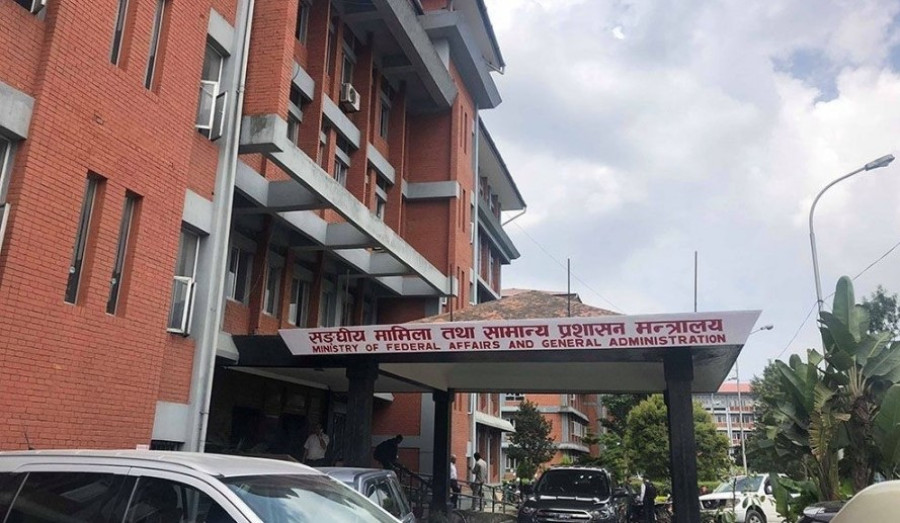National
Local governments have failed to prepare enough laws to oversee their matters, report says
Absence of human resources and lack of understanding of local governments’ powers are listed among reasons.
Prithvi Man Shrestha
Thulibheri Municipality in Dolpa wants to utilise its forested area to collect revenue. But it can’t do so as the federal government has yet to prepare a law to allow local governments to do that.
Local governments should prepare their own laws based on federal laws, according to the constitution. Management of forests and wildlife falls under the shared jurisdiction of federal, provincial and local governments.
“Without the federal government preparing its own law first, we can’t prepare our own laws,” said Mayor Ganesh Bahadur Shahi. “We can’t collect revenue under the existing forest laws.”
According to a study conducted by the Ministry of Federal Affairs and General Administration, many local governments have been unable to draft their laws even for issues under their constitutional jurisdictions due to a number of factors. The most important reason behind their failure is that the federal government hasn’t formulated all laws required by the local governments to function in accordance with the constitution.
Local governments don’t have the human resource to prepare crucial pieces of legislation and the frequent transfers of chief administrative officers also don’t help the cause. Even the people’s representatives are not abreast with constitutional provisions.
As a result, federal agencies handle many activities related to education, agriculture and land management, although they come under the jurisdictions of local governments, the report titled ‘Comparative Study of Laws Introduced by Local Level-2077,’ says.
The report, based on field visits and study of documents available online related to 49 local governments, showed that only three local councils have introduced more than 15 pieces of legislation, including Acts, rules, working procedures and directives. According to the study, four local governments have introduced 11 to 15 legal documents.
The authors of the report said that local governments haven’t promulgated laws related to issues such as charging of service fees and penalties, and collection of revenue from natural resources like forests, wildlife, birds, water, environment, ecology and biodiversity that are under the concurrent jurisdictions of the federal, provincial and local governments. Areas such as civil registration, archaeology, management of ancient monuments and museums and landless squatters have also been overlooked.
The study also found that not a single piece of legislation has been introduced even in areas which fall under the complete jurisdiction of the local governments. For example, none of the 49 local governments has prepared legislation on the collection of local statistics, the management of archives, and the protection of mines and minerals.
Most of the local governments have prepared laws utilising the federal government’s model laws. These laws are mostly related to the running of daily administration and providing various services to the community, said the report.
But, local governments have failed to promulgate laws that would help them carry out activities related to their constitutional jurisdictions, it said.
“One of the main reasons why local governments haven’t promulgated their own laws is the federal government’s failure to work as a guardian to the local governments until they become institutionally stronger,” said Khim Lal Devkota, an expert on federalism. “The federal government failed to provide adequate model laws for them.”
According to him, given the lack of expertise with the local governments, the central government could have formed a neutral think tank to help all local governments prepare their laws. “Such a think tank could help prepare reference materials which could be helpful while making new laws,” he said.
He also added that the tendency among local governments to wait for the central government’s help has also delayed the introduction of a number of laws.
In the case of some of the laws, the central government has shown the willingness to take charge even of sectors that fall under the constitutional jurisdiction of local governments.
The lack of knowledge and expertise among elected representatives and staff of the local governments has resulted in a mismatch between local laws, according to the report.
Such a situation arose also due to the lack of legal staff at local governments. “We need a legal officer but we don’t have the funds to appoint one,” said Mayor Shahi.
Another reason behind the delay and discrepancy in lawmaking is the frequent transfers of chief administrative officers, the report says. With the federal government not sending a replacement, the post remains vacant for a prolonged period, according to the report.
Dispute among elected representatives has also delayed the lawmaking process in some local governments. “We failed to introduce some laws due to a dispute among elected representatives about six or seven months ago,” said Balaram Yadav, chief administrative officer of Siraha Municipality.




 16.12°C Kathmandu
16.12°C Kathmandu













